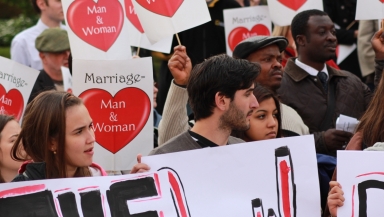
The latest poll showing support for the Ashers Baking Company's stance on refusing to bake a cake with a slogan supporting gay marriage makes interesting reading. Yes, 56 per cent of respondents thought that the company should have the right to refuse the commission. However, 80 per cent thought that it would be entirely wrong for a taxi company to discriminate against gay people, and – perhaps more surprisingly – 63 per cent thought it would wrong for a hotel to discriminate.
So what's going on here? The difference, I think, is between baking a pro-gay cake and facing a pro-gay person. It is subtle, but profound enough to show up pretty conclusively in a survey. Saying that you won't produce something by a mechanical process is very different from looking someone in the eye and saying, "I don't want you here."
However: these intimate personal interactions are far too subtle for the law to cope with. And there's the rub: because we're talking about what the law should and shouldn't do.
At the moment, it means that you can't discriminate against someone on the grounds of their sexuality, any more than you can on the grounds of their colour. Now, it is eminently arguable, in fact, that Ashers weren't doing that. They exercised discrimination in a way that they were perfectly entitled to do. If they were Democratic Unionists who declined to bake a cake with an Ulster Unionist slogan, the Equalities Commission wouldn't have batted an eyelid.
However, here's the thing: I think the law is, in principle, right. I think it represents a moral advance. I don't believe you should be able to refuse to serve someone just because they're gay and you're not – or vice versa. And yes, I know, I really do know and understand what that means for people who believe that their sincere, deep and perhaps costly views about sexuality mean that they can't comply. I can see what it means for the bed and breakfast owner who feels profoundly that hosting a gay couple would mean conniving at sin.
But here's the other thing: I can see what it means for that gay couple who are turned away at the door, too. I can imagine the hurt, the perceived insult and the anger.
The trouble is that there are competing rights at stake, and once that happens, there are going to be winners and losers – and because the social current is running in a particular direction, it is going to be conservative Christians who are the losers. So the image of the Christian as the person who is always saying "No", resisting change to the last ditch, convinced that he or she is the world's victim, becomes more and more entrenched – and it's not a pretty sight.
So how about this: what happens if Christians resolve not to play the world's game at all? What happens if we don't stand on our rights, if we don't insist on our own way, if we don't feel that we have to adjudicate on other people's moral decisions? What happens if, instead of trying as hard as we can to win our case, we try as hard as we can to show our grace? Because one of the problems with court cases is that both sides lose, no matter who wins. Both of them look self-righteous, vindictive and petty.
One of the things that Jesus did with divine effectiveness was to subvert the legalistic, honour-shame conventions of his day. In Matthew 5:38-41 he tells someone who's been struck on the right cheek – a Roman's insulting backhander – to offer the left: "I'm a man like you, so hit me like a man." A grasping creditor is shamed because he doesn't even leave his debtor with a coat to keep himself warm. A Roman legionary who press-gangs a Jew to carry a load for a legal mile ends up in a world of trouble because the obliging victim insists on carrying it for two.
He goes on, "Love your enemies, and pray for those who persecute you." People who don't believe what we do aren't our enemies, but all too often we act as if they are.
So here's what I'd like to see. I'd like a society which was mature enough and enough at ease with itself for gay couple who wanted a weekend away to be able to ring up a Christian guest house owner and say, "By the way, we're gay, is that OK?" And the owner would say, "We'd rather not, are you OK with that?" And the enquirer would say, "Fine." Or even better, the owner would say, "No worries, you're welcome."
We're nowhere near that. But I really believe that Christians ought to be trailblazers here.
Sometimes people say, "Just because you're a Christian it doesn't mean you should just stand there and take it when people attack you." It's usually an encouragement to stand up and fight – and usually about the wrong thing.
Actually, though, it's right. You don't just stand there and take it. You step forward, and embrace. And if that means a hotel run by conservative Christians putting a sign up saying "Gays welcome here" – well, that sounds pretty Christ-like to me.


















